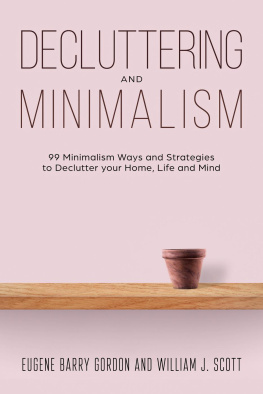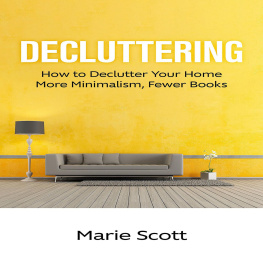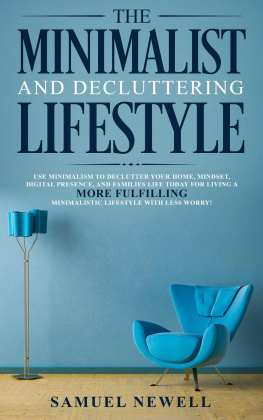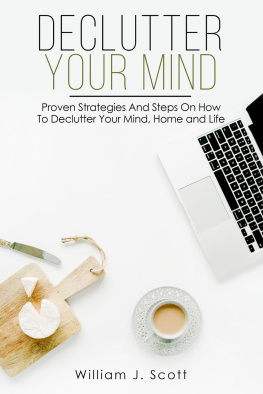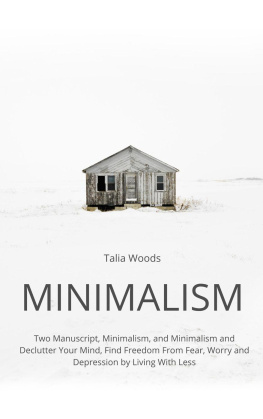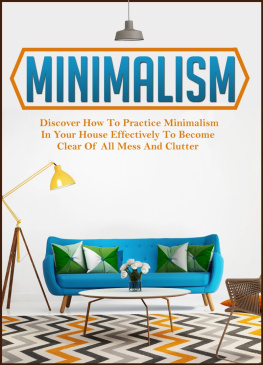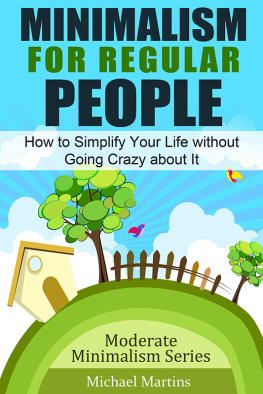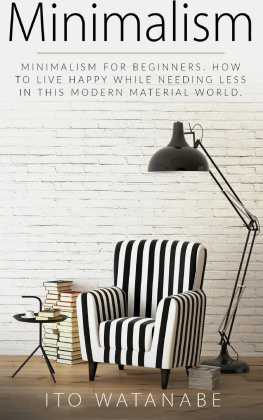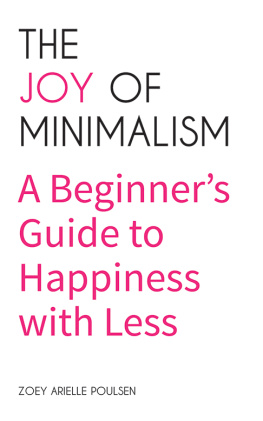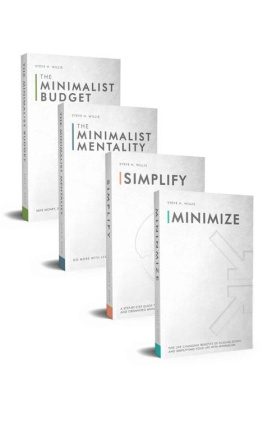Decluttering 50 Minimalism Ways and Strategies to Declutter your Home and Life Table of Contents Introduction I want to thank you and congratulate you for downloading the book, Decluttering: 50 Minimalism Ways and Strategies to Declutter Your Home and Life. This book contains proven steps and strategies on how to reduce the clutter, minimize the belongings that you may have and provides a way to organize thoughts to result in a more fulfilling and simplistic lifestyle. Several barriers may prove inhibitory to minimalism, key among them, resistance to change. Change may be hard as we have become attached to routines and things. We allow our homes and minds to become storage spaces for every passing fancy and in the process, we get so busy trying to attain these objects that we end up not having time to enjoy that which we have already accumulated. The corporations can be afforded some of the blame but truth be told they are just doing what they were created to do. That would be to make sure the products are out of their shelves and in our homes. It does not matter what trick they use to distract or misdirect as long as they achieve their objective and they do not care about your general wellbeing. Once the truth of the last statement is internalized you can start to think about how to regain your life back from the very things that have kept you prisoner within your space for a very long time. It sounds like the logical thing to do by living with less considering it will mean less to clean, less debt which means less stress. Overall that would mean more energy and money to go around. That would imply that many people are actually ready to minimalize but they usually get stumped by the next step which is where to begin. Then you end up with several individuals who are of the mindset that they can and should survive with less but they are literally trapped by everything that they have. This leads to being overwhelmed and defeated by the very idea. The journey of de-cluttering neednt be as hard as most would make it out to be. Minimalism is the absolute opposite of consumerism whose philosophy is to entertain yourself with anything that you would desire at any time of the day and night provided you has the means to do so. That is the reason for 24-hour stores and online door to door service delivery. Societally speaking we have a glut of products and services. Anything can be attained at the click of a button and a few hours wait even if it leads to the debt of the buyer. Consumerism would have you overspend on the holidays because of the season theme and still overspend several times during the year because of sales promotions or just plain availability of the product. In your heart of hearts, you know that you do not need the latest iPhone or that antique that was allegedly availed at the curio shop because you bought three of those each year for the past three years. The voice in your head saying you need all of it has been carefully engineered to lead you to the cashier and not make you the wiser until you reach home. In order to combat consumerism, it would need a conscious effort to abstain from it and focus on how you have lived your life and how you would like to proceed going forward. Minimalism can be approached from a philosophical point of view and we can discuss how the new approach is going to make our lives better and result in a change in the community. De-cluttering can thus, be approached in the same way that dieting is done. That means we can go right in and account for everything that we own as a person and rate it on a scale then assign a value like the way food is assigned calories. Then we can hack things off from that list according to ranking so as to starve ourselves. A lot of the time though, many people feel deprived and go on a binge thereafter so they wind up right where they started. So the thing would be to change a lot of things including the coping habits in times of lack. The development of a de-cluttering mindset will mean changing the way that you make decisions concerning the valuables that you already have and the stuff that is included in everyday life. Instead of being a short-term solution, things become a long-term commitment or solution to a new way of life. Now this book will cover 50 minimalism ways to de-clutter not just your home but also your life. So these tenets can be used in every other area surrounding the home environment and to change the way that you live life in an effective manner. The first part of the book will consider the home and various aspects around it. Other aspects to be considered in the 5 process challenge include expecting change, indulging less, cleaning out social media and managing holiday excess. Of course, the home is the primary area of concern when it comes to de-cluttering but it is not the only place that requires this school of thought. It can, however, be used as a starting point that can germinate to other areas of life. Now each area of the house presents a unique challenge. You can opt to go room by room and explore more dynamic ways to tackle each of them. You can start with the family room and debate the merits of each piece of furniture or go into the bedroom where you can purge the excess to come up with a peaceful setting. The kitchen and the garage would follow after the bedroom and closets. Each room would follow a thorough dress down to see what is needed and what is not. All of this can be jotted down in the ranking system that was previously claimed and used as a means for justifying the materials that you dont really need. Then you will be able to explore how being a minimalist would make you a better citizen on earth and help with such things as conservation. You can also look at the main impact of your consumer choices and examine the human and environmental toll on the things which you buy. Copyright 2018 by Eugene Barry Gordon - All rights reserved. This document is geared towards providing exact and reliable information in regards to the topic and issue covered. The publication is sold with the idea that the publisher is not required to render an accounting, officially permitted, or otherwise, qualified services. If advice is necessary, legal or professional, a practiced individual in the profession should be ordered. - From a Declaration of Principles which was accepted and approved equally by a Committee of the American Bar Association and a Committee of Publishers and Associations. In no way is it legal to reproduce, duplicate, or transmit any part of this document in either electronic means or in printed format. Recording of this publication is strictly prohibited and any storage of this document is not allowed unless with written permission from the publisher. All rights reserved. The information provided herein is stated to be truthful and consistent, in that any liability, in terms of inattention or otherwise, by any usage or abuse of any policies, processes, or directions contained within is the solitary and utter responsibility of the recipient reader. Under no circumstances will any legal responsibility or blame be held against the publisher for any reparation, damages, or monetary loss due to the information herein, either directly or indirectly. Respective authors own all copyrights not held by the publisher. The information herein is offered for informational purposes solely and is universal as so. The presentation of the information is without a contract or any type of guarantee assurance. The trademarks that are used are without any consent, and the publication of the trademark is without permission or backing by the trademark owner. All trademarks and brands within this book are for clarifying purposes only and are the owned by the owners themselves, not affiliated with this document. | 

